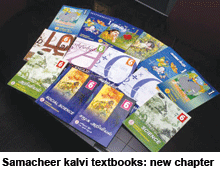Sixty days of uncertainty at the start of the new academic year of an estimated 12 million K-10 students enroled in Tamil Nadu’s 63,312 government, aided and private schools affiliated with the state, Matriculation, Anglo Indian and Oriental school examination boards over implementation of samacheer kalvi or common school curriculum legislated by the ousted DMK government in June 2010, finally ended on August 9. A three-judge bench of the Supreme Court directed the newly elected AIADMK government to implement the common school curriculum mandated by the state govern-ment’s Uniform System of School Education (USSE) directive in all K-10 schools and distribute the prescribed textbooks within ten days. Private schools have been permitted to use textbooks of state government-appr-oved private publishers, at their option.
The bench comprising Justices J. Panchal, Deepak Verma and B. S. Chauhan dismissed the Jayalalitha-led AIADMK government’s appeal against a Madras high court order of July 18 upholding the Tamil Nadu Uniform System of School Education Act (TNUSSE) 2010, and quashed an amendment to s.3 of the Act introduced by the Jayalalitha government deferring implementation of the common curriculum.
 Citing 25 reasons for upholding the high court judgement, the Supreme Court judges held that a predetermined political decision had been made to scrap the TNUSSE Act by the AIADMK government, as tenders had been invited by the government to print books under the old syllabus even before the first cabinet meeting of the new state government which assumed office on May 15. The bench also stated that the objective of the TNUSSE Act, 2010 was to provide uniform education statewide in the interest of quality education to all children, and that any objectionable content in textbooks could have been deleted by the Jayalalitha government as per directions given in the high court judgement by issuing executive direc-tions instead of staying implementation of the Act for an indefinite period.
Citing 25 reasons for upholding the high court judgement, the Supreme Court judges held that a predetermined political decision had been made to scrap the TNUSSE Act by the AIADMK government, as tenders had been invited by the government to print books under the old syllabus even before the first cabinet meeting of the new state government which assumed office on May 15. The bench also stated that the objective of the TNUSSE Act, 2010 was to provide uniform education statewide in the interest of quality education to all children, and that any objectionable content in textbooks could have been deleted by the Jayalalitha government as per directions given in the high court judgement by issuing executive direc-tions instead of staying implementation of the Act for an indefinite period.
The Supreme Court verdict has ended two-month-long litigations for and against the common school curriculum since May 18, after the newly sworn-in Jayalalitha government postponed the implementation of samacheer kalvi by amending s.3 of the TNUSSE Act on the ground that the common syllabus and textbooks prescribed were sub-standard. While the deferment of samacheer kalvi was welcomed by private Matriculation school managements, it angered activists of the State Platform for a Common School System (SPCSS). Since then, a battery of lawyers representing the state government, Matriculation schools, and SPCSS have filed writs in the high court and Supreme Court. Meanwhile 12 million children were stuck in limbo for 60 days after start of the new academic year since the Tamil Nadu Textbook Society had printed 90 million samacheer kalvi texts whose distribution had been stayed by the AIADMK government.
In Chennai, it’s hardly secret that the AIADMK’s freeze of the predecessor DMK government’s USSE legislation was driven more by spite and the deep antagonism between the DMK and AIADMK which supplant each other in Fort St. George — the seat of the state government of Tamil Nadu (pop.72 million). Little thought is given to the impact of such political cut-and-thrust on innocent and apolitical school children. Nevertheless while the Supreme Court ruling has restrained the AIADMK government from prolonging the agony of children aspiring to a half-decent education, it has not adequately addressed the issue of the quality of the samacheer kalvi textbooks prescribed by the former DMK government.
While government and aided school teachers are happy with the common syllabus, they still feel they need training and guidance to understand and deliver it effectively. However, private Matriculation school managements are disappointed with the judgement. “Instead of encouraging academic diversity, the Supreme Court’s verdict endorses academic regularisation. With implemen-tation of the dumbed down common syllabus, our students will find it difficult to compete effectively with students from CBSE and CISCE board schools in national entrance exams. Even though the DMK government mandated a common curricular framework for all schools, it should not have prescribed common textbooks for all schools,” says Alfred Devaprasad, CEO, Alpha Group of Institutions, Chennai.
Be that as it may, a new chapter in school education has begun in Tamil Nadu with the introduction of a common school syllabus. It is now up to schools and teachers to make the best of the syllabus and enrich their curriculums to differentiate themselves.
Hemalatha Raghupathi (Chennai)